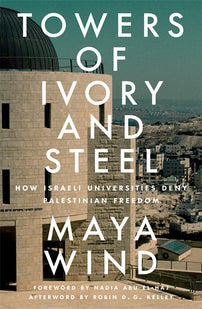Towers of Ivory and Steel: a Letter from the Editor
One of our February Verso Book Club titles.

All of the books I have the privilege of helping into the world in my position at Verso contribute in their own way towards a project of collective liberation. That is the whole reason I do the job. It is nonetheless true that some do so more directly than others. Maya Wind’s Towers of Ivory and Steel does so more than most. Working with Maya over the course of the last two and half years has taught me a lot about what it means to be a scholar and remain accountable to a movement for liberation.
Launched in 2004, the call from the Palestinian Campaign for the Academic and Cultural Boycott of Israel (PACBI) to boycott cultural institutions has, over the last 20 years, been heeded by a growing list of musicians, artists, cultural workers and academics. But while the high profile nature of cultural figures such as Sally Rooney has meant the cultural boycott has been repeatedly in the headlines, the A in PACBI has received markedly less attention.The academic boycott has made significant and important progress, but many universities in the West continue to collaborate on research and offer joint degree programmes with Israeli academic institutions, claiming that these universities are bastions of liberal freedom. Israeli academic institutions themselves plead that they should not be held accountable for violence against Palestinians, which, they invariably insist, has nothing to do with them. Almost all Israeli academics, including those who are critical of the government, and may even support BDS in other sectors, argue that PACBI’s accusations of complicity are untrue.
Using libraries, archives and Hebrew-language sources only accessible to Israelis, conducting interviews with Palestinian scholars and students, and drawing on the extensive research undertaken by Palestinian academics and civil institutions, Maya has undertaken an enormous task. The result brings into English an incontrovertible spread of evidence that documents Israeli academia’s very real—material, historic and ongoing—complicity. Maya methodically traces the way archeological digs are used to justify the expulsion of Palestinians from their land in tandem with the theft of Palestinian archeological artefacts, and how scholars at Israeli institutions are integral to providing legal defences for the Israeli military operations. She looks at the links between the security services and Middle East Studies departments across Israeli academia, revealing an alarming pattern of direct involvement in the security state. Beyond this direct academic complicity, she traces the strategic geographic placement of the universities themselves in relation to the Israeli state’s territorial and demographic project of “Judaization”, as well as their direct involvement in developing military technology, including through chemical, biological, and nuclear research.
Written prior to the current genocidal attack on Gaza and the raids, intimidation, violence and murders in the West Bank that rose sharply in 2023 and continue into 2024, Towers of Ivory and Steel reveals the dismaying and consistent lack of solidarity with Palestinians from Israeli academic institutions. The accounts of the systematic repression and censorship of Palestinian faculty, staff and students at these same institutions give further lie to the fairy tales told by the defenders of these institutions. What emerges across this remarkable book is a comprehensive and devastating indictment of Israeli academia, and an indispensable tool for the arsenal of the BDS movement.
Rosie Warren, Verso Editor
London, January 2024
Towers of Ivory and Steel: How Israeli Universities Deny Palestinian Freedom by Maya Wind is one of our January Verso Book Club options. Learn more about the Verso Book Club here.
[book-strip index="1" style="buy"]

